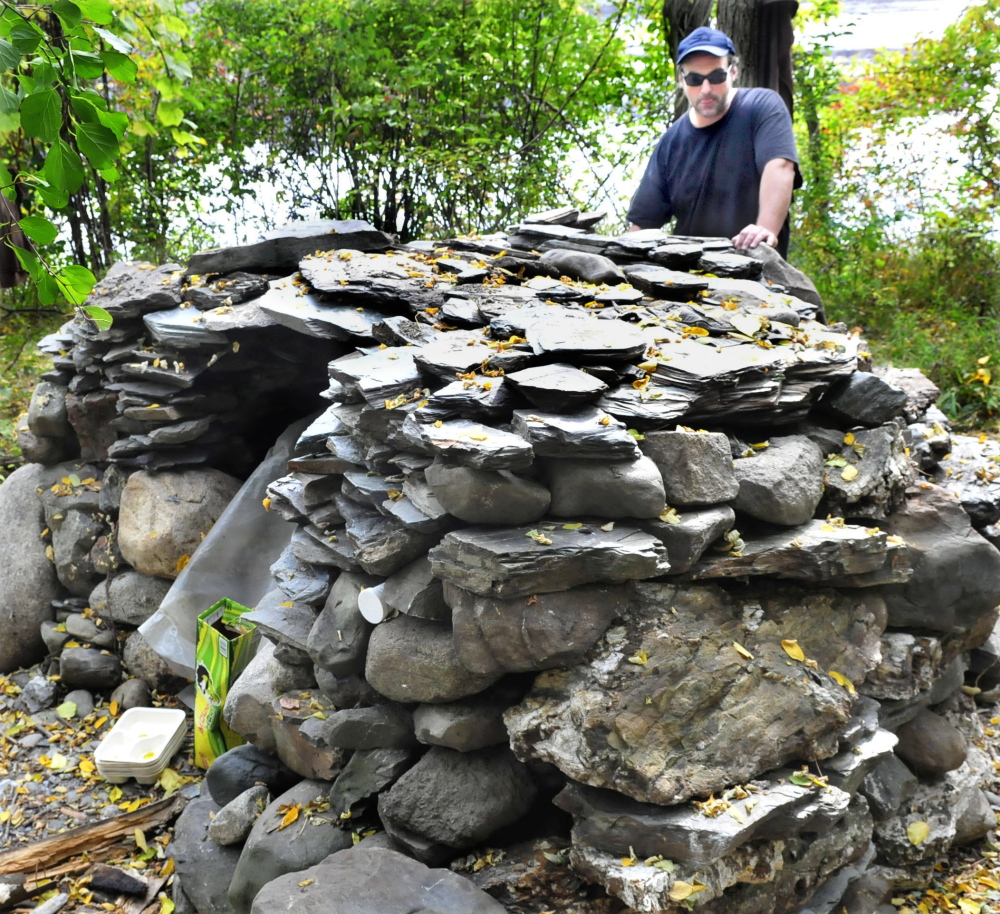The homeless encampment on the banks of the Kennebec River was quite large and partially hidden among the locust trees, whose yellow leaves were fluttering to the ground.
There was a large, elaborate fire pit made of slate and stones, clothes hanging on fallen trees, a couple of chairs, a blue tent pitched on a hill.
A man wearing dark glasses and dressed all black, greeted me.
He identified himself as Aaron Lowden and said he had been living in the Waterville encampment since July, when he left the Mid-Maine Homeless Shelter.
“I was fully acquitted by the Maine Supreme Judicial Court on Feb. 25,” he said. “I had been wrongly accused of trafficking in methamphetamines. It took me 23 months to do it, but I finally got it to a high enough court.”
Lowden, 43, is not shy about telling me his story, as he leans alternately against the fire pit and a nearby tree.
On this scenic, quiet piece of land on the Kennebec, where cormorants and mallard ducks skim the water and an occasional blue heron swoops overhead, Lowden gets to be alone, away from society.
“I prefer to be in the woods. I’m not a social butterfly. That’s the same reason I don’t like to be in the homeless shelter. I prefer to be by myself.”
The shelter is not far away, up the hill and over the railroad tracks. The police station is there, too, a reason Lowden says he does not feel in danger, living where he does, on city-owned property. Occasionally, police officers come with firefighters to check the site, where homeless people come to live for a while and then move on, Lowden said. Over the summer, a handful of people stayed a month or so, he said.
In the nearby woods leading south to Head of Falls, there are other, smaller encampments connected by crude walking paths, where the ground is well-worn and blankets, clothes and food packaging are strewn about. On this day, the sites were unoccupied.
Lowden told me he suffers from schizotypal personality disorder, which causes him to hear things that are not being said and makes him despondent and uncomfortable in social situations. He also has attention deficit disorder.
He subsists on food he buys with his food stamp card, as well as meals served at the homeless shelter. The people who run the shelter are nice, he said, adding that he does not like to be in structured environments.
“I go up to the shelter every morning and take a shower. During the week, they will give me breakfast and they have a free meal at six o’clock, too. I don’t like to go over to (Sacred Heart Soup Kitchen on) Pleasant Street, just because I prefer to be here. I wash my clothes in the sink at the shelter. The administrator just asked me Friday if I wanted to come back. I said, ‘If you’ll feed me and let me come in a take a shower, that’s all I want from this institution.'”
Lowden says he walks to nearby Save-A-Lot on The Concourse downtown to buy food.
“The only communication I have is to go to the library and use the Internet. That’s where I communicate with my family — my son and his mother.”
His 6-year-old son, he said, lives across the river and he gets to see him several times a week. He is the one bright spot in his life, which was complicated from the start.
Lowden grew up in Whitefield and as a teenager, was arrested for growing marijuana and placed in the youth center in South Portland, he said. He escaped from the youth center, which did not have a fence.
“I went AWOL and chased the Grateful Dead around from coast to coast and when I turned 18, I came back to the state of Maine.”
In Arizona in 2000, he was crossing the street and got hit by a car and was badly injured. He suffered broken bones and brain damage and was in a coma 28 days, he said.
“I have no recall of the accident at all.”
He became involved with drugs and ended up at Ray Brook, a federal prison in New York, where he earned aGED (General Education Development certificate). Eventually, he took classes at North Country Community College in Saranac Lake, N.Y., and later, at University of Maine at Augusta, garnering about 70 college credits in the liberal arts. He got into a relationship with his chemistry lab partner there and had their son. While the couple is not together now, they have an amicable relationship, he said.
Lowden said he has a voucher for housing and plans to get an apartment when the weather gets too cold to live outdoors.
“When the foliage falls, that’s what’s really going to drive me out,” he said, adding that the camp will be more exposed then.
Meanwhile, he will visit his caseworker at Kennebec Behavioral Health, look for an apartment, and continue to visit his son, he said.
Later that day, when I returned to my office, I found Lowden’s court records, which confirmed he was acquitted of trafficking in methamphetamines in February. Poring over the records, I thought about a question I had asked him earlier, before saying good-bye.
“Where would you like to be in five years?”
He hesitated, seemingly searching hard for an answer.
“Hopefully, I’ll get an apartment and I’ll spend a lot of time being a father. I would be more together with my son than I am if I wasn’t so despondent. I do not want to be a burden to my family. I enjoy being a father. He’s doing all right but I’m not trying to be a drag on him.”
Amy Calder has been a Morning Sentinel reporter 26 years. Her column appears here Mondays. She may be reached at acalder@centralmaine.com
Send questions/comments to the editors.






Comments are no longer available on this story